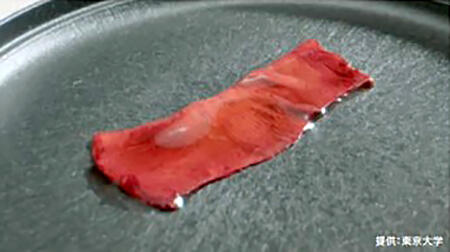The consumption of meat is expected to increase on a global scale due to global population growth and changing lifestyles. However, there are growing concerns over the impact of meat production on the environment, including the massive volume of grain required for food, deforestation carried out to obtain water and farmland, and greenhouse gas emissions derived from rearing livestock. Given this situation, cultured meat, or meat grown in vitro outside the body, is expected to become a new source of meat.
A joint research group comprised of Professor Shoji Takeuchi of the Graduate School of Information Science and Technology, the University of Tokyo, and Nissin Foods Holdings, has succeeded in creating Japan's first edible cultured meat through industry-academic collaborative research in the field. The same research group had already succeeded in creating the world's first cultured meat shaped like diced steak in 2019. However, they were forced to utilize ingredients not approved for use in food for technical reasons, and the produced product was not edible as a result. However, for this attempt, the group used food blood serum and food blood plasma gel that they developed themselves, which enabled them to create the cultured meat using only ingredients that can actually be eaten, and so achieved an edible product after approval by the University of Tokyo Ethics Committee. One person involved in the research commented on the meat, saying, "It has a firm texture and a mild savory flavor."
This result means that in addition to the standard analysis using equipment, sensory evaluation by humans is now also possible, bringing the progress one step closer to the creation of cultured steak that possesses the flavor, smell, and texture of real meat. The research group will proceed with further work with the aim to produce larger blocks of the meat with a size of 2 cm x 7 cm x 7 cm by March 2025, while establishing mass production technology that combines good taste with low production costs.

Source: The University of Tokyo




